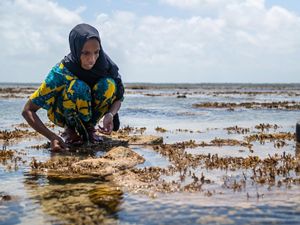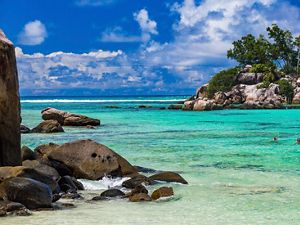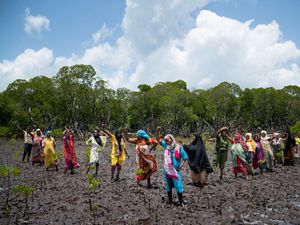Protecting the Ocean in Africa
Conserving marine ecosystems through strategic planning, habitat restoration, and sustainable fisheries management.
The vast ocean waters surrounding Africa are teeming with life, from the deep sea’s rich abundance of phantasmagorical creatures, to mid-water migration routes of fishes, to the vibrant shallow water coral reefs bustling with activity. Yet, overfishing, habitat destruction, and climate change are among the many stressors straining the resilience of Africa’s marine life. TNC is partnering with local communities and governments to protect two of Africa’s largest marine ecosystems: the Western Indian Ocean and the Benguela Current. Through three main pillars of strategic ocean planning, habitat restoration, and sustainable fisheries management, we are building a future where both people and nature can flourish.
Stats out of the Blue
-
1/2
Half of the oxygen on the planet comes from the natural processes of ocean plankton.
-
90%
Since the Industrial Revolution, the ocean has absorbed about 90% of the excess heat in our atmosphere.
-
3 B
More than 3 billion people depend on fish and other ocean species for food and income.
-
8%
Only 8% of the ocean is legally protected.
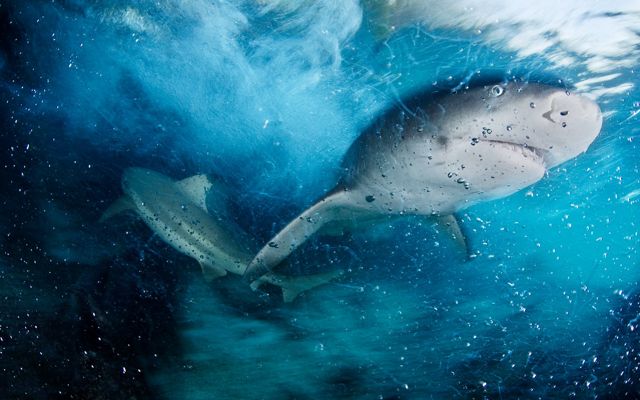

Ocean Planning and Policy
Marine Spatial Planning (MSP) is a science-based process that helps countries map their ocean space to balance biodiversity protection with economic activities. By putting the highest levels of protection on the most biologically valuable areas while allowing marine activities in others, countries can develop their Blue Economies while ensuring a sustainable future for our ocean.
Seychelles has been a pioneer in innovative ocean conservation financing. The country’s commitment to increase the protected area of its ocean from 0.04% to 30% by 2020 came out of a groundbreaking debt conversion co-designed by the government of Seychelles and TNC. Now, 410,000 square kilometers (158,000 square miles)—an area larger than Germany—is fully or significantly safeguarded to encourage sustainable development and to adapt to the effects of climate change. This groundbreaking effort, supported by the Seychelles’ Conservation and Climate Adaptation Trust (SeyCCAT) has already provided $3.2 million in funding for 70 community-led conservation projects. In addition, its Marine Spatial Plan, covering all 135 million hectares of marine waters Is on track for signing in early 2025.
Gabon announced in 2023 a groundbreaking $500 million debt conversion aimed at protecting its marine environment. Gabon’s coastal waters are home to some of the world’s iconic populations of endangered species, including leatherback turtles and the critically endangered Atlantic humpback dolphin. However, like many countries, Gabon has faced significant challenges in funding the protection of these valuable ecosystems.
In partnership with TNC, Gabon’s innovative Blue Bonds for Ocean Conservation project will generate $163 million for ocean conservation efforts. This funding will help Gabon achieve its ambitious goal of protecting 30% of its marine waters by 2030. The project is supporting marine planning, improved fisheries management, and strengthened efforts to combat illegal fishing. By aligning conservation goals with sustainable development, this initiative not only protects Gabon’s ocean but also supports its growing blue economy, creating long-term benefits for both people and nature.

The Blue Benguela Partnership, launched in 2023, brings together Angola, Namibia, and South Africa to protect one of the world’s most important marine ecosystems—the Benguela Current Large Marine Ecosystem (BCLME). This area stretches along the coast of southwest Africa and is known for its rich marine life, including important fish species and endangered animals. However, the region also faces threats from overfishing and environmental degradation.
The partnership, led by TNC with the Blue Nature Alliance, aims to protect these waters by securing sustainable funding and improving how the BCLME is managed. Some of the key outcomes include establishing new marine protected areas (MPAs), improving fisheries management, reducing illegal fishing, and involving local communities in both resources management and conservation. The project also focuses on marine spatial planning, ensuring the long-term health and sustainability of the region's ocean resources and coastal communities.
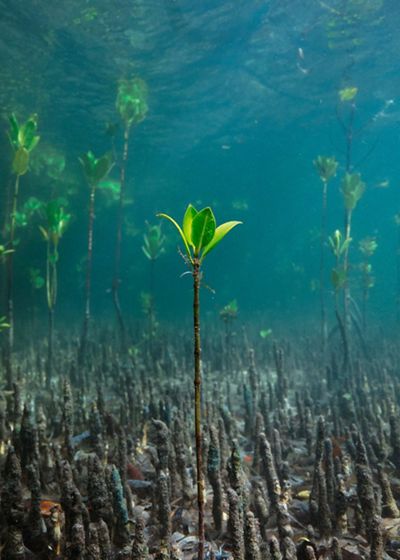
Protection and Restoration
Healthy oceans rely on thriving habitats. TNC is working alongside Reef Resilience Network and local communities to restore coral reefs, mangroves, and other ecosystems that support both wildlife and people. In July 2024, the Western Indian Ocean Coral Reef Restoration Network was launched, bringing together local fisher communities to lead coral restoration efforts across the region. TNC is co-managing over half of Kenya’s 60,000 hectares of mangroves in partnership with the Kenya Forest Service, strengthening coastal biodiversity and climate resilience.
We Can’t Save Oceans Without You
Sign up to receive monthly conservation news and updates from Africa
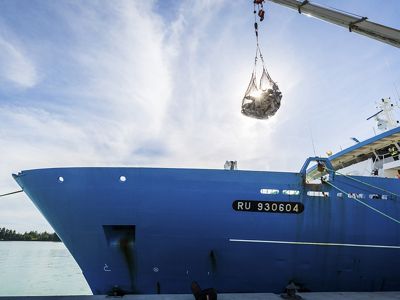
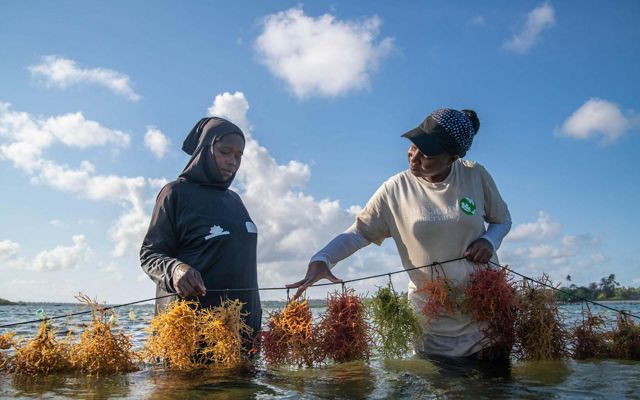
Sustainable Fisheries and Aquaculture
Sustainable fishing practices are essential to the health of our oceans and the well-being of communities. TNC is working across all levels of the industry—from local artisanal fishers all the way to large offshore fleets—to ensure that fisheries will thrive for generations to come.
In TNC-led pilot projects, Seychelles, Tanzania, Kenya and Gabon are using cutting-edge Electronic monitoring (EM) systems—the use of on-board video cameras, sensors, and GPS—on fishing vessels to see what animals are being caught in near real time, thereby closing important data gaps, improving fishery management, reducing illegal fishing, and minimizing bycatch. TNC plans to scale up these efforts such that vast areas of ocean are no longer ‘out of sight out of mind’ and will be brought under better management.
In coastal communities across Kenya and Tanzania, TNC’s sustainable seaweed aquaculture program is providing new opportunities for over 1,000 local farmers. Spanning 16 villages—eight in Kenya and eight in the Zanzibar Islands in Tanzania—we are training farmers in sustainability practices for more than 2,000 hectares of seaweed farms, improving both livelihoods and ocean health.
By working together with partners, including governments, NGOs, and local communities, we can ensure our ocean ecosystems are healthy, fisheries remain intact, and the oceans can continue to provide for the people who depend on them.

